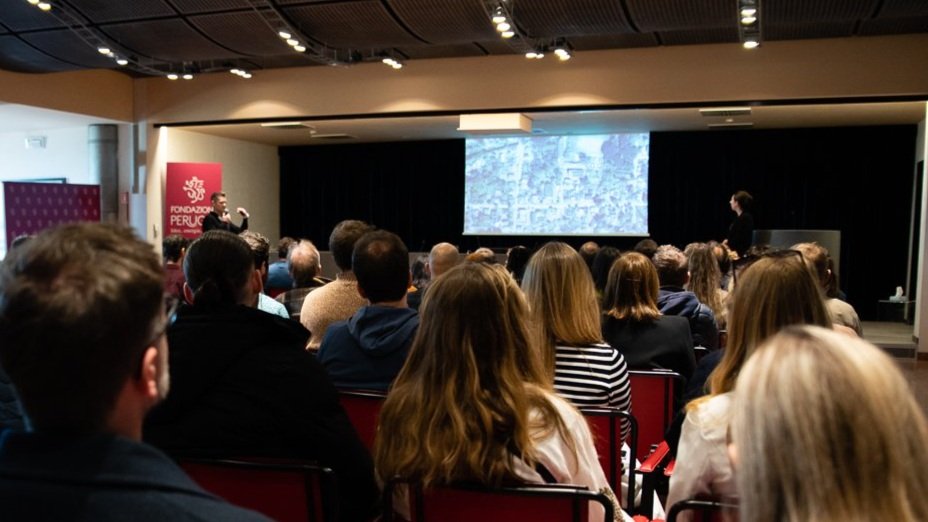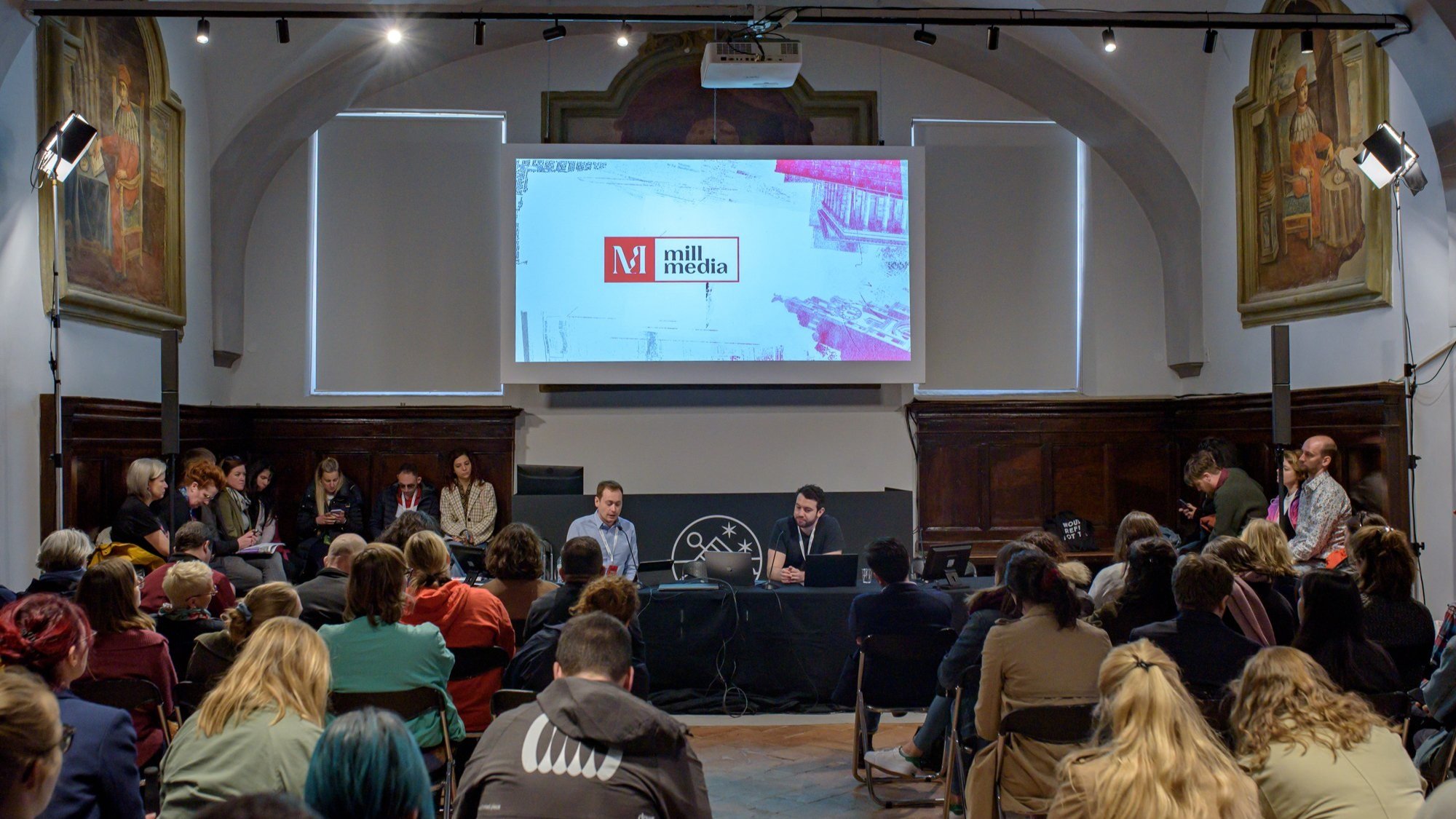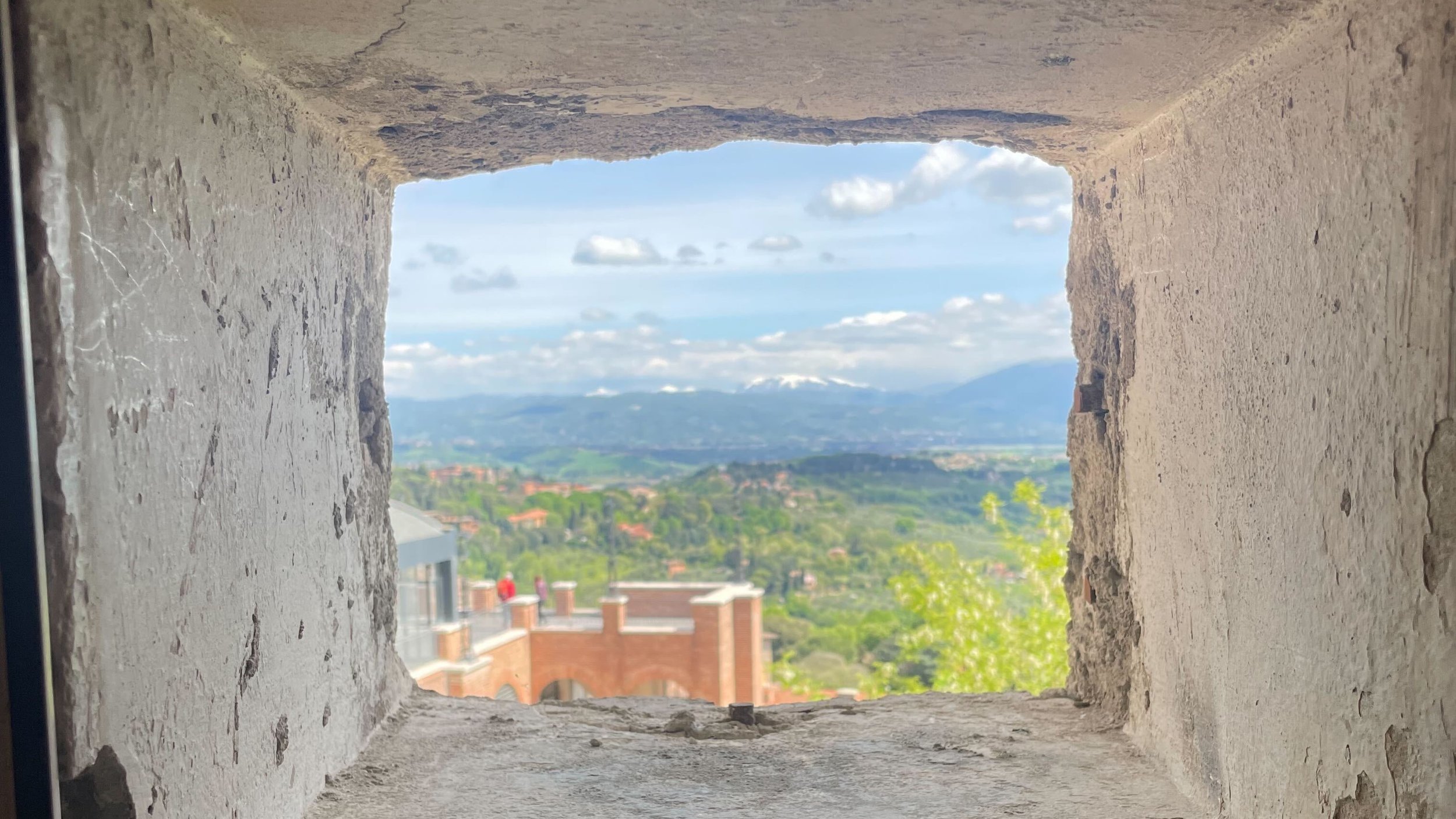Perugia Journalism Festival highlights
Earlier this month, Alex went to Perugia and attended the International Journalism Festival. In this post he shares some highlights and take aways together with links to interesting projects andthe videos of some panels he followed.
Alex attended the International Journalism Festival in Perugia. Can you spot him in the audience? | Photo: Diego Figone #ijf24
#IJF24 was my third time in Perugia for the festival although it was very busy, more than previous editions and a bit colder than usual it was such a stimulating event. Thankfully all the panels are available online so you can find the links to the videos on the Festival’s website and here I will put a selection of the talks that I followed and some comment.
I divided the talks into four macro-topics:
Cross-boarder and narrative changing journalism
Trust in Journalism
Future of Media
A.I. and its impact on the industry.
1. Cross-boarder and narrative changing journalism
When working in journalism I often wonder why certain editorial choices are made and if it could be possible to re-imagine a different narrative, focus and context for the sort of stories we cover.
Focus on Africa, what matters and how we tell it
Panel on 'Africa: exploring new news (why news doesn’t have to be bad).´ | Photo: Francesco Cuccio #ijf24
A big topic that we have been discussing within our Gothenburg Media Hub team, is why in our Scandinavian or European media we give so little space to Africa? We are planning on running a project to try and explore this question, more info coming soon.
Back to the panel, Africa is so close to Europe and it’s such a big and diverse continent but we rarely hear about what’s happening there, unless it’s a disaster that gets a one-off reportage and then back to radio silence.
What stories are told on Africa and how they are told has an impact on the people affected and their identity. This was a key take away of the panel organised by Africa No Filter, which is an organisation that supports storytellers and organisation working to shift stereotypical narratives of Africa.
Africa: exploring new news (why news doesn’t have to be bad)
Pan-European media ambitions
Panel on Cross-border journalism in practice | Photo: Are We Europe
Another aspect is changing the narrative from focused on one country to that of a broader European level. ENTR is a European project that focuses on reaching young people across the E.U. especially in rural areas to bring news about other European countries. Some of our team members in Gothenburg have also been involved in the production of a short video documentary for them and the work is coordinated by Deutsche Welle, Are We Europe, France 24 and others.
Amongst the panelists Mick, from Are We Europe and Judith from N-Ost, to who we at GMH have a special relation with as they organised ‘The Circle’, which is the E.U. project that brought us together as a hub in the first place.
Cross-border journalism in practice
2. Trust in Journalism
Trust in journalism was another important theme and for this I followed a panel on climate journalism and another on OSINT, how to use tools to verify and fool-proof videos.
Disinformation risks in Climate Journalism reporting
Panel on ‘Truth in the age of climate crisis | Photo: Diego Figone #ijf24
When it comes to climate reporting, sometimes even big international media houses can be mislead by certain studies or fall under corporate pressure when reporting on climate. I asked a question to the panel of their advice when it comes to choosing media partner or journalist to collaborate for reporting on a country where environmental damage is ongoing, based on previous challenges when selecting and building trust with partners during a cross-boarder investigation I worked on a few years ago.
Truth in the age of climate crisis: journalism's crucial role in exposing climate misinformation
Solving the puzzle by analysing videos
Panel on ‘Geo-journalism’ | Photo: Diego Figone #ijf24
Many stories are hard to tell because they happen in countries that are very dangerous for reporters to work in or in areas hard to reach, however rumours and claims of certain crimes are posted on the web, especially social media.
This was a very practical panel on techniques and tricks you can use to analyse videos and establish stuff such as location, time of day, day of the year, year, authenticity etc. the pros in this kind of journalism call this “OSINT” = open source intelligence. The session was run by digital investigator Benjamin Strick who is also the director at Centre for Information Resilience and investigative reporter Reade Levinson.
Geo-journalism: how to use open source materials for investigative reporting
3. Future of Media
Another big topic I enjoyed following is the future of news and interesting journalistic projects that are spinning around the way news is produced moving away from click bates and focusing on long reads and building a community with its readers. Here are a few very interesting panels and some other projects that I bumped into during my time in Perugia.
The success stories of putting readers at the heart of a journalistic start-up
Panel on Empowering journalism through user-centric models | Photo: Alex Maxia
Lessons on how to obtain growing numbers of paying readers from the founders of Zetland (Denmark) & Daily Maverick (South Africa). Building a community and even hostin Live Journalism events helps to create that connection with the readers who feel they are contributing to the newspaper not only financially but also with their imput.
Empowering journalism through user-centric models: lessons from Daily Maverick and Zetland
Manchester Mill’s quality over clickbait quest to save local journalism
Panel on Saving local journalism? | Photo: Andrea di Valvassone #ijf24
In Manchester and many other parts of the U.K. local media was reduced to clickbaits with very limited staff under a lot of pressure to produce many news stories a day.
This is where Joshi Herrmann, founder and editor-in-chief of Mill Media, got the idea to make in depth quality journalism for a local audience in Manchester first and has now expanded in other cities in the north of England.
The need for journalism to keep local politcians in check is big and even U.S. Senator Bernie Sanders visited the team and supports the project!
Saving Local Journalism?
Link: https://www.journalismfestival.com/programme/2024/saving-local-journalism
More interesting projects to look out for
Beyond following these sessions, it was interesting to meet the founders and the team behind The European Correspondent, a European newsletter-based bringing updates from journalists located in every European country. No more helicopter journalism, but local knowledge and cultural understanding to tell the stories that matter.
Another cool team I met is Irpi Media an investigative journalism publication based in Italy that has run many international investigations and collaborated with many outlets in Italy and internationally. During the Festival they launched a new membership package to support the independence of their work, whilst still maintaining all the articles free to access and advert free. Pretry cool, right?
4. Journalistic reporting beyond the journalist
Though a lot of journalism is happening on social media and the individual news anchor or influencer has a key role this is where the journalist as an individual takes a step back in order to tell a story.
It is in the case of journalists who use A.I. technology to help them in their reporting and those who sacrifice everything, their personal freedom and sometimes even their own lives, to get the story out there.
Stories that live even when the journalist doesn’t
Panel How can we pursue the investigations of silenced journalists? | Photo: Bartolomeo Rossi #ijf24
This was a panel organised by Forbidden Stories, which is Paris based journalistic project that makes sure journalistic work continues, even if the journalists behind it are arrested or killed in the process of working on a story.
The idea that journalists stand up for other journalists and join forces to make sure investigations get completed, despite the dangers and threats is really powerful. It shows a level of determination and resiliance that crosses boarders and newsrooms. Laurent Richard, founder and director of the project, moderated the panel.
How can we pursue the investigations of silenced journalists?
A.I. and its impact on the journalism industry.
Panel on How to tame neural networks in AI models, for us, in newsrooms and in society | Photo: Alex Maxia
There were many sessions on different aspects of the arrival and future impact of Artificial Intelligence in the media sphere. I did not follow too many sessions on this but one that I found quite interesting was this one where amongst the speakers there was Olle Zachrison, head of A.I. development at Sveriges Radio, who gave some examples of how AI is being used now to transcribe audio but underlined how swedish public service will not clone human voices.
How to tame neural networks in AI models, for us, in newsrooms and in society – using our human neural networks wisely.
Other Highlights from Perugia
Meeting Nordic Journalists
It was fun to meet up with Hilde Sandvik the founder and presenter of the panscandinavian family thereapy radio show ‘Norsken, svensken og dansken’. This is the only Scandinavian cross-border radio show and podcast that is broadcast by public service radio in Norway, Sweden and Denmark.
Together with Hilde, I created a group chat and organised a few spontanous meet-ups in Perugia with other Nordic journalists which gave us the chance to meet new colleagues from other media outelts and countries and practice speaking Scandinavian as much as possible! Could there be a Nordic themed panel at Journalism Festival 2025? I guess we will find out in less than a year!
Talking to cross-border minded journalists
There were several meet-ups and mingles during the festival that allowed for informal conversations and exchange of knowledge on working with diverse teams on cross-boarder projects. In particular I would like to highlight the one organised by Unbias the News and Journalismfund Europe in which I met many colleagues who have similar interests for investigations, cross-border projects and working on more philosophical and structural questions related to where journalism is at today and where it’s going.
Many of the topics of cultural differences, finding ways to collaborate, the communication limitations of working remotely and motivation to keep going when the pressure is on, are topics that are surprisingly more comment than you would think, which is good to know. Knowing that some of the challenges you are facing are also faced by others, helps a lot.
View over snowy mountains in the distance from Perugia | Photo: Alex Maxia
You find all the sessions from the Journalism Festival 2024 edition and previous editions too via the Perugia Journalism Festival website or YouTube channel.
Lily held a Creative Mornings talk
Lily Ray at Creative Mornings Gothenburg
“We had to find out what was missing in Gothenburg’s media landscape - and then create it!”
Lily Ray talked about this and much more at today's inspiring breakfast meeting with CreativeMornings Gothenburg.
Starting from this month's theme "spicy"🌶 , Lily shared her journey from Australia to establishing herself as a freelance photographer and journalist in Sweden.
The Gothenburg Media Hub is, of course, part of that story and we're happy we got to connect with so many early risers who came to listen to Lily today.
Scroll through the gallery to find Lily's recipe for a spicy and successfull life as a media freelancer - and keep an eye on our socials and website for a little extra help.
Thank you to those who attended, we hope to see you again soon!
Lily Ray talking at todays’s Creative Mornings Gothenburg event.
We are registered as a non profit!
It all begins with an idea.
It all begins with an idea. Maybe you want to launch a business. Maybe you want to turn a hobby into something more. Or maybe you have a creative project to share with the world. Whatever it is, the way you tell your story online can make all the difference.
Don’t worry about sounding professional. Sound like you. There are over 1.5 billion websites out there, but your story is what’s going to separate this one from the rest. If you read the words back and don’t hear your own voice in your head, that’s a good sign you still have more work to do.
Be clear, be confident and don’t overthink it. The beauty of your story is that it’s going to continue to evolve and your site can evolve with it. Your goal should be to make it feel right for right now. Later will take care of itself. It always does.
How to survive as a freelance journalist - our first event
It all begins with an idea.
It all begins with an idea. Maybe you want to launch a business. Maybe you want to turn a hobby into something more. Or maybe you have a creative project to share with the world. Whatever it is, the way you tell your story online can make all the difference.
Don’t worry about sounding professional. Sound like you. There are over 1.5 billion websites out there, but your story is what’s going to separate this one from the rest. If you read the words back and don’t hear your own voice in your head, that’s a good sign you still have more work to do.
Be clear, be confident and don’t overthink it. The beauty of your story is that it’s going to continue to evolve and your site can evolve with it. Your goal should be to make it feel right for right now. Later will take care of itself. It always does.















